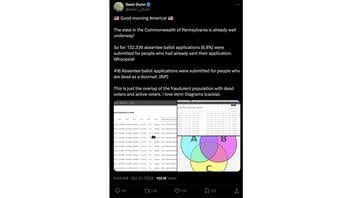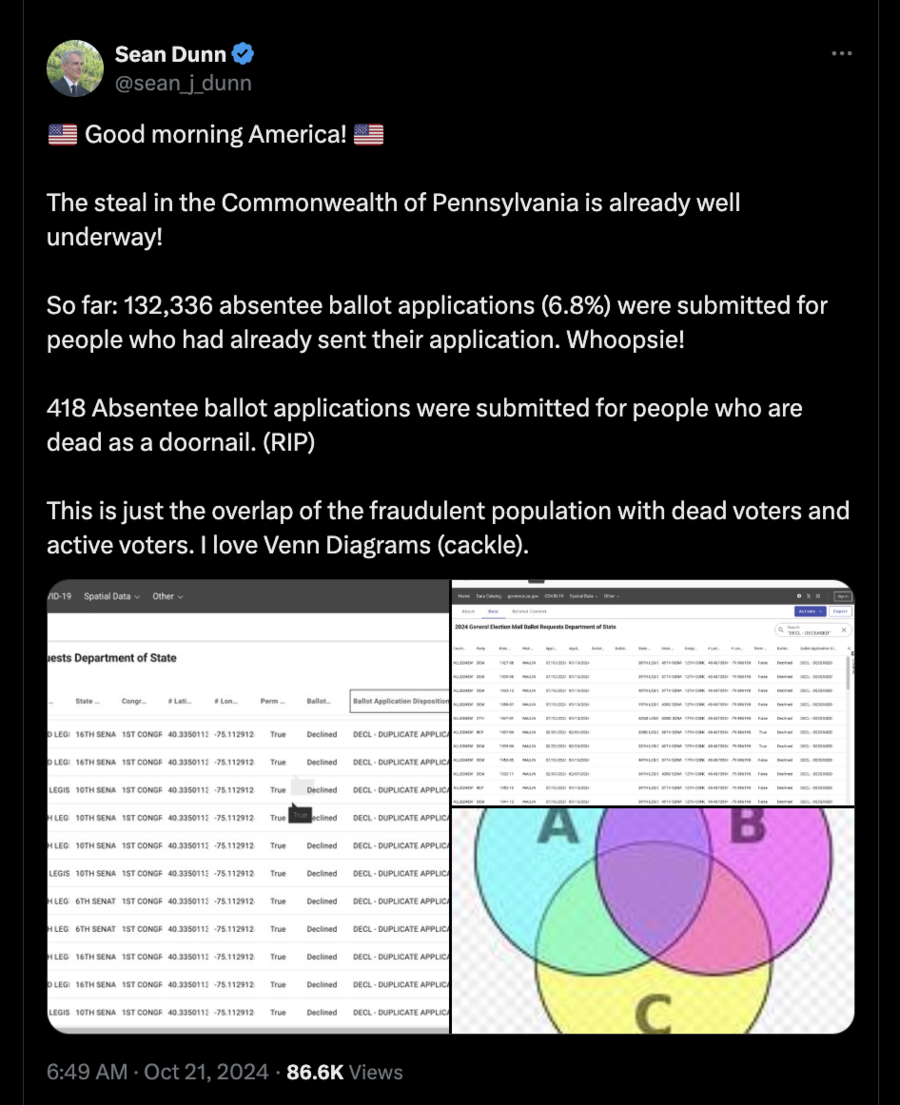Fact Check: Canceled Mail Ballot Applications In Pennsylvania Do NOT Prove Voter Fraud — It Proves Election Officials Verify Requests Before Sending Out Actual Ballots

Does the cancellation of 132,336 “absentee ballot” application duplicates and “418 absentee ballot applications” from dead people prove that “the steal in the Commonwealth of Pennsylvania is already well underway”? No, that’s not true: That only proves that election officials do their job ensuring proper verification of mail ballot requests, Pennsylvania Department of State’s press secretary told Lead Stories. Mail ballot applications are not actual ballots, and such requests are verified specifically to ensure that one voter gets one ballot.
The claim originated from a post (archived here) on X, formerly known as Twitter, on October 21, 2024. It said:
🇺🇸 Good morning America! 🇺🇸
The steal in the Commonwealth of Pennsylvania is already well underway!
So far: 132,336 absentee ballot applications (6.8%) were submitted for people who had already sent their application. Whoopsie!
418 Absentee ballot applications were submitted for people who are dead as a doornail. (RIP)
This is just the overlap of the fraudulent population with dead voters and active voters. I love Venn Diagrams (cackle)
This is what the post looked like on X at the time of writing:
(Source: X screenshot taken on Wed Oct 23 13:31:13 2024 UTC)
The post included screenshots of the data set of the 2024 General Election Mail Ballot Requests Department of State, available via the Open Data PA government portal.
Contrary to the post on X, the database doesn’t show exclusively absentee ballot applications.
Pennsylvania distinguishes (archived here) between mail-in ballots and absentee ballots:
-
Mail-in ballot: Any registered voter can apply for a mail-in ballot.
-
Absentee ballot: Registered voters who can’t make it to their polling place on Election Day because of illness, disability, work, or travel can apply for an absentee ballot.
The term “mail ballot request” includes both. The state database shows that and a few sub-categories in the column titled “Mail Application Type.”
In Pennsylvania, law requires that election offices send applications for mail-in or absentee ballots to anyone who is registered to vote and has requested this form. Though verification occurs later, the state has multiple mechanisms in place (archived here) to ensure that its voter rolls are current. That includes but is not limited to the Electronic Registration Information Center, also known as ERIC (archived here) — a database with shared access to the election officials from 24 member states and the District of Columbia that helps keep voter rolls up to date.
Additionally, Pennsylvania’s Administration of Voter Registration publishes annual reports. The most recent 2024 issue says that Pennsylvania canceled voter registrations of 93,593 deceased people and 4,239 individuals who requested that.
When asked about the claim, Pennsylvania Department of State Press Secretary Matt Heckel told Lead Stories via email on October 23, 2024:
The screenshots show that the Commonwealth promotes transparency in election administration, so citizens can check for themselves. It also shows that Pennsylvania’s county election officials are doing their job to ensure another safe, secure, and fair election. Part of that process includes identifying and declining applications from voters who inadvertently submitted more than one application. It also involves declining applications for mail voters who died after they submitted their mail ballot request.
But even in a hypothetical scenario if a person receives more than one ballot, the system will be able to catch it, Pennsylvania’s Department of State told Lead Stories via email, answering follow-up questions on October 23, 2024:
Each mail ballot’s outer envelope has a unique barcode tied to each specific voter and each election, which prevents registered voters from being able to vote more than once in any given election. If, for any reason, a voter receives and attempts to submit a duplicate mail ballot, only the first mail ballot the county receives will be counted; duplicates will be rejected after the barcode is scanned.
In the past, duplicating mail ballot applications occurred for a few reasons.
Voters can make human mistakes. For example, in 2020, the ProPublica investigative website (archived here) reported that “more than 90%” of 372,000 rejected ballot applications “were denied as duplicates, primarily because people who had requested mail-in ballots for the state’s June 2 primary did not realize that they had checked a box to be sent ballots for the general election, too.”
Furthermore, Pennsylvania is one of the states that does not prohibit outside groups from sending voters mail ballot applications, based on their voter registration information, according to the official website of the Commonwealth of Pennsylvania (archived here). It continues:
You may receive multiple applications from different groups, all asking that you submit the application to your county. You only need to apply one time to register to vote or to receive a mail ballot. If you do submit multiple applications, your county will only process and approve a single registration or one mail ballot. Although your county will keep our elections secure by making sure each voter receives one ballot, duplicate forms can pose a burden on them. Before filling out a second form, you can check to see if your county has received an application from you already by going to vote.pa.gov/mailballotstatus.
The website (archived here) of Pennsylvania state Sen. Judy Ward advises on such cases:
You can determine who sent it by looking for the ‘Paid for by…’ language somewhere on the mailer.
The state and/or county government will not send you an application if you did not request one.
In 2020, millions of Americans across the country received ballot applications, ABC News (archived here) reported. Besides political parties, such forms may be mailed by voter engagement groups, such as the nonprofit, nonpartisan and nongovernmental Center for Voter Information, whose primary goal, according to its website (archived here), is to send out voter registration forms and mail ballot applications.
Lead Stories debunked similar claims about Pennsylvania in 2022 and 2020.
Other Lead Stories fact checks of the claims about the 2024 U.S. presidential election can be found here.



